Studio portrait of Lydia Gardner, Nannie Little Robe, and Ethel Black Wolf.
Arapaho
![Lydia Gardner, Nannie Little Robe, and Ethel Black Wolf [version 1], c.1890 Lydia Gardner, Nannie Little Robe, and Ethel Black Wolf [version 1], c.1890](/sites/default/files/styles/views_taxonomy/public/image-photo/NAA_73400.jpg?itok=Z9urK8ft)
![Lydia Gardner, Nannie Little Robe, and Ethel Black Wolf [version 2], c.1890 Lydia Gardner, Nannie Little Robe, and Ethel Black Wolf [version 2], c.1890](/sites/default/files/styles/views_taxonomy/public/image-photo/CCHS_PA-CH1_056a.jpg?itok=DpJTDPoj)
Studio portrait of Lydia Gardner, Nannie Little Robe, and Ethel Black Wolf.
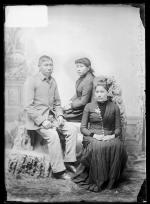
Studio portrait of Lydia Harrington, Frank Harrington, and Jessie Spread Hands. Frank Harrington is wearing a school uniform.
![Nineteen Arapaho students [version 1], c.1890 Nineteen Arapaho students [version 1], c.1890](/sites/default/files/styles/views_taxonomy/public/image-photo/NAA_73299.jpg?itok=lre1W--N)
Studio portrait of sixteen male students and three female students. The caption identifies them as from the Arapaho tribe.
![Nineteen Arapaho students [version 2], c.1890 Nineteen Arapaho students [version 2], c.1890](/sites/default/files/styles/views_taxonomy/public/image-photo/CCHS_bsch035.jpg?itok=H1lrQ-bU)
Studio portrait of sixteen male students and three female students. The Cumberland County Historical Society's cataloging identifies them as from the Arapaho Nation. No date is provided.
![Albert White Wolf [version 1], c.1891 Albert White Wolf [version 1], c.1891](/sites/default/files/styles/views_taxonomy/public/image-photo/NAA_73802.jpg?itok=jCA7Wf3w)
Studio portrait of Albert White Wolf.
![Albert White Wolf [version 2], c.1891 Albert White Wolf [version 2], c.1891](/sites/default/files/styles/views_taxonomy/public/image-photo/CCHS_PA-CH2_052c.jpg?itok=M7R_vAnI)
Studio portrait of Albert White Wolf.

Studio portrait of James Paints Yellow, Charles Dubray, and Paul Good Bear.
Note: Previous cataloging indicates a date of November 1881 is included in the handwritten caption. However, due to the dates of attendance of these students, we believe the date is actually November 1891.
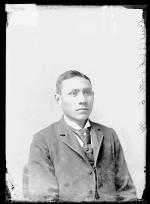
Studio portrait of Ben Come Up Hill.
Note: The handwritten caption contains the date December 1891.
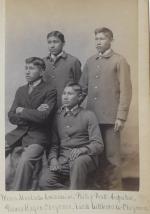
Studio portrait of Darwin Hayes, Wesson Murdock, Jacob Little Man, and Philip Pratt. Three are in school uniforms.
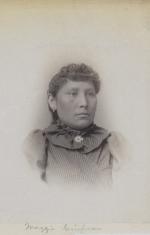
Studio portrait of Maggie Simpson.
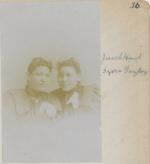
Studio portrait of Jessie Spread Hands (left) and Izora Taylor (right). Both are wearing school uniforms.
![Cheyenne and Arapaho chiefs and students [version 1], 1894 Cheyenne and Arapaho chiefs and students [version 1], 1894](/sites/default/files/styles/views_taxonomy/public/image-photo/NAA_73830.jpg?itok=IwBGPEVL)
Studio portrait of two visiting chiefs with ten male students and ten female students.
Previous cataloging indicates that these are Cheyenne and Arapaho chiefs and students, and that the date of the photo is March 1894.
![Cheyenne and Arapaho chiefs and students [version 2], 1894 Cheyenne and Arapaho chiefs and students [version 2], 1894](/sites/default/files/styles/views_taxonomy/public/image-photo/CCHS_PA-CH3_101.jpg?itok=-886AEY2)
Studio portrait of two visiting chiefs with ten male student and ten female students.
Previous cataloging for the National Anthropological Archives version of this image indicates they are Cheyenne and Arapaho chiefs and students and that it was taken in March 1894.
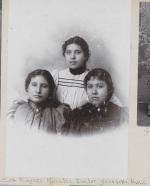
Studio portrait of Eva Rogers, Rosalie Doctor, and Jeanette Rice.
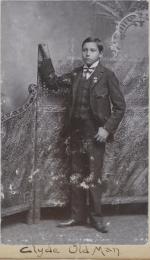
Studio portrait of Clyde Oldman.
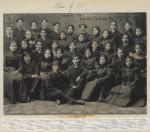
Studio portrait of fifteen male students and nineteen female students, the graduating class of 1899. According to the label on this photo they are:
Back row: Christian Eastman, Annie Gesis, Joseph Gouge (here J. Jennings Gouge), George Hazlett, Sarah Williams, Chauncey Archiquette, Eliza Smith (here E. Lillian Smith),…
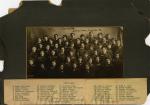
Studio photograph of the graduating class of 1903. They are identified as: 1. Tatiyopa, Henry, 2. Kimball, John, 3. Ezhuna, Joseph, 4. Doxtator, Commodore, 5. Doxtator, Alice, 6. Brown, Lillian, 7. Hill, Amy, 8. Bishop, Frank, 9. Brushel, Samuel, 10. Callsen, Minnie, 11. Callsen, Katie…
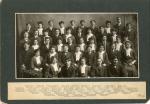
Studio portrait of a large group of seated and standing male and female students, identified as the graduating class of 1904. They are identified in a label attached below the photo.
The label notes that Martha Enos was part of the graduating class but not included in the photo.
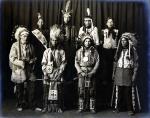
Group portrait of eight male students wearing costumes. They are the "Braves' Chorus," characters in the performance of the play, "The Captain of Plymouth," produced at the school from March 29-March 31, 1909.
The program lists eleven students in the Braves Chorus: Ernest Quickbear, Lyford John, Thomas Rowland, George Gates, David…
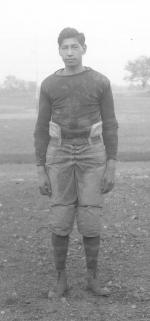
Portrait of Bruce Goesback standing in a field wearing a football uniform.
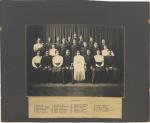
Studio portrait of a large group of seated and standing male and female students, identified as the graduating class of 1911. They are identified in a label attached below the photo. They are: 1) Mazie Skye 2) Estelle W. Ellis 3) Elizabeth Keshena 4) Emma La Vatta 5) Minnie White 6) Ellen Lundquist 7) Nan Saunooke 8) Edison Mt. Pleasant 9)…
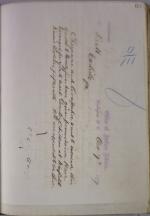
Telegram from Commissioner of Indian Affairs Ezra Hayt to Richard Henry Pratt informing him that Hayt has given permission for an increased recruitment quota from the Cheyenne and Arapaho Agency. The new number of young people will be 25.
Hayt also tells Pratt that the party of young people from Indian Territory will be meeting him…
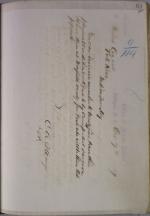
Telegram from Commissioner of Indian Affairs Ezra Hayt to the Agent of Cheyenne and Arapaho Agency John D. Miles which tells Miles that he has permission to recruit 25 young people to be sent to Carlisle.
Hayt orders Miles to have a physician certify these young people's health then send them to Winfield, Kansas to meet Pratt on…
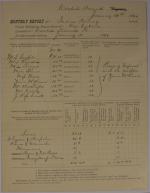
Two duplicate copies of the monthly school report for January 1880, submitted by the Carlisle Indian Training School to the Bureau of Indian Affairs. The report includes a list of employees, a count of students by Nation/Tribe, descriptions of the educational program, and Superintendent Richard Henry Pratt's remarks about developments and…
